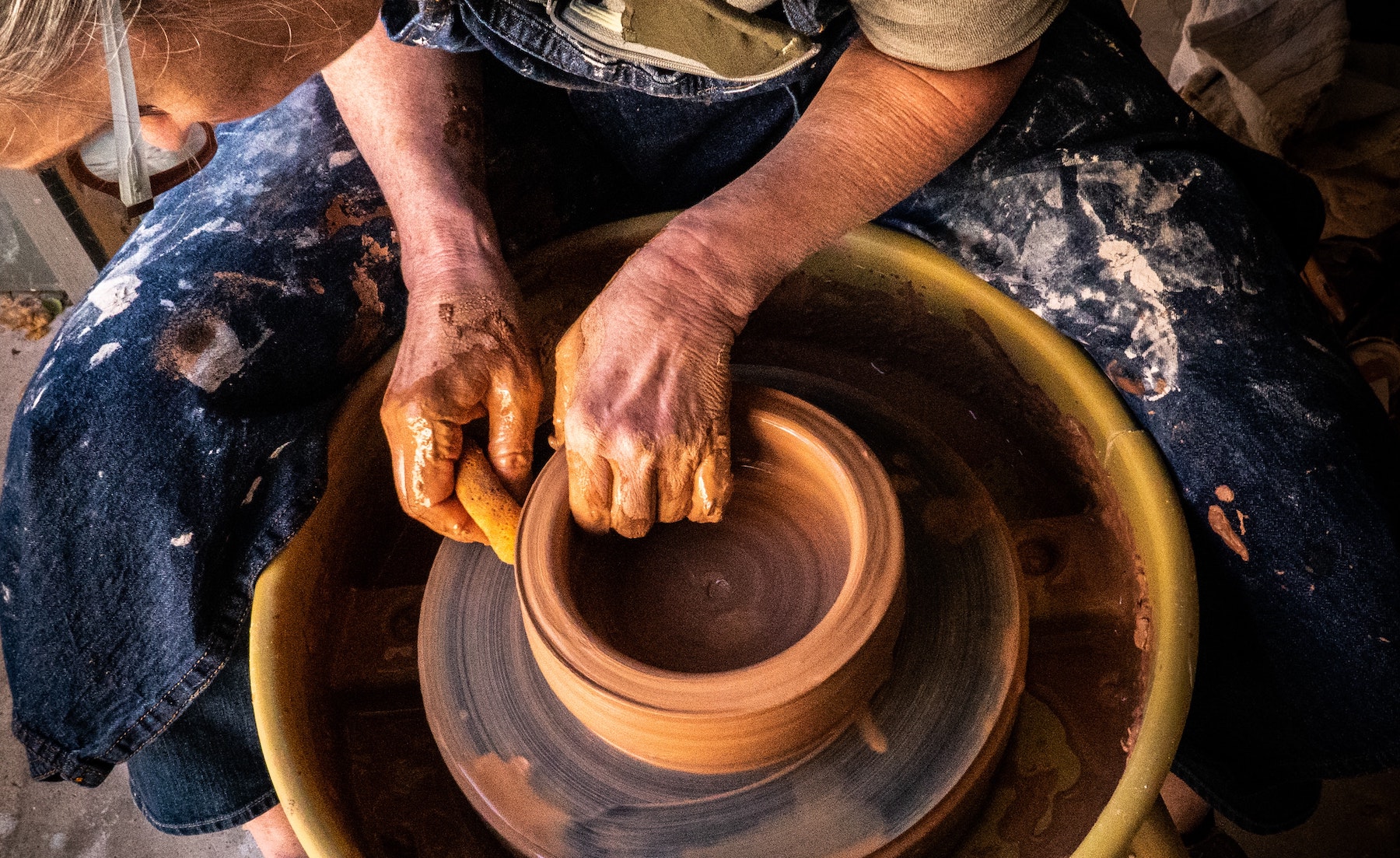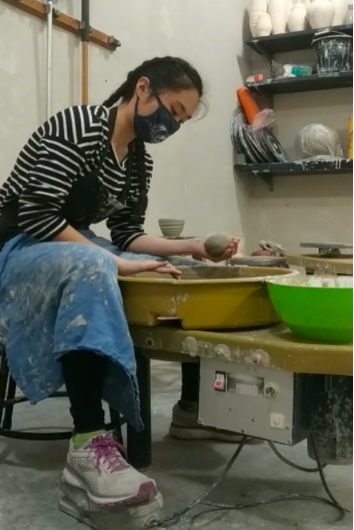
If you think about it, clay really has a pretty easy job as long as it is watered and yielded in the centre of the wheel. It’s the Master Potter’s hands that are doing the work, reflects Dr Ang Chin Sim. Photo by Earl Wilcox on Unsplash
What does this title bring to your mind? Some body dysmorphia or Ed Sheeran’s song?
My daughter recently did a ceramics course. It took many hours of hands-on time and practice of shaping clay into different creations, starting from basic to more elaborate designs. Her hard work paid off and each end product was excitingly different from the original lump of clay that she started off with.
Pottery then and now
This experience inspired me to revisit the “Potter and Clay” analogy mentioned in the Bible.
God is called the Potter and we are the clay. Although this analogy made sense in the past, I had never really delved into it in much detail until I was exposed vicariously to the steps of pottery making via my daughter.
In the book of Jeremiah, the prophet was told by God to go to the potter’s house where he found a potter holding a misshapen lump of clay. It pleased the potter to remould it into a vessel that was good to him. (Jeremiah 18:1-4)

At the pottery session with my daughter, which made me reflect on the analogy of the Potter and the clay, writes Dr Ang Chin Sim. Photo courtesy of Dr Ang Chin Sim.
Pottery making has not changed much since the time of Jeremiah. In ancient days, the potter used a manually rotating wheel, the speed of which was controlled by the potter’s foot using a little treadle.
Modern day potters may use an electric motor to turn the wheel, but this is still controlled by the foot of the potter. Through the centuries and to this day, potters use clay, put it on the wheel, skilfully shape and mould it into the vessel in mind.
As we go through the steps of pottery making, let’s see how this applies to “the shape of you”.
1. Clay needs water
In order to mould the clay, water needs to be added to make the clay soft and pliable. Clay that does not have enough water is brittle and breaks up as it is turned on the wheel.
By immersing ourselves in the Word, the Holy Spirit can convict us regarding things in our lives that need remodelling.
God’s Word is like water. If we want God to mould us we need to be watered by the Word of God.
By immersing ourselves in the Word, the Holy Spirit can convict us and speak to us regarding things in our lives that need remodelling.
Just as water is essential to our physical bodies, the Word of God is essential to a Christian’s shaping and changing to be more like Christ.
Some of our hearts are hard, and God is unable to do anything in our lives. A hard lump of clay can’t be used to mould a vessel. However, there is hope for a hardened lump of clay, all you need to do is to soak it for a few days in a bucket of water and then it can be conditioned to the appropriate consistency for usage.
2. Clay needs to be centred on the wheel
An important first step for pottery making is to centre the clay on the wheel. It’s one of the most boring things that a pottery student needs to learn, yet so essential.
To be perfectly centred on Christ means we allow Him full control of our lives.
Sometimes we go for the mediocre, like being just slightly off centre, and think that it will do.
When the wheel starts turning on an off-centred piece of clay, it may form a shape initially but, as it gets pulled and stretched, it will break up eventually.
Similarly, we need to be perfectly centred on Jesus Christ, which means we need to have complete surrender and allow Him to have full control of our lives.
If we try to live our lives on our own and are not fully centred on Him, when difficulties and times of testing start to pull on our lives, we can rip and tear apart because we weren’t centred to begin with.
3. Clay moulding needs to be done at a steady pace
In this day and age, we’re used to having things fast.
God the Master Potter has a different timing from us humans.
We have our instant food, high speed Internet, and we even play Youtube videos at twice the speed because we’re impatient with slowness.
When making a vessel, the potter has the wheel turning at an appropriate and steady pace.
Sometimes God’s timing is too slow for us, we want to speed up the process. If the potter puts the wheel turning at a very fast speed, the clay can suddenly rip apart.
Some of us get impatient with the process of God shaping us. We want to get there quickly and be over and done with it. Nevertheless, God the Master Potter has a different timing from us humans. Shaping does take time for us to be completely well formed.
4. Clay needs to undergo stretching
The potter’s hands work to stretch the clay horizontally, vertically and in various directions that form the shape of the vessel preconceived in the potter’s mind.
God will stretch you in ways you may not foresee.
In order to grow as a Christian, there’s going to be stretching required – quite often in ways that we never imagined for ourselves.
He may call you to do something different, something out of your comfort zone, something you are unfamiliar with. It’s a reflex response to say, “God, I can’t do it” and come out with multiple questions and reasons.
When God called Moses and spoke to him at the burning bush to lead the children of Israel out of Egypt, Moses had a barrage of doubts.
God provided Moses with the answers and capabilities to handle the seemingly enormous task at hand.
Quite often God does not only call the equipped, He also equips the called (Hebrews 13:21). In order to grow as a Christian, there’s going to be stretching required – quite often in ways that we never imagined for ourselves.
5. Clay needs to be shaped to its full potential
While clay is being stretched, it starts to become larger and taller as the potter puts his hands both inside and outside of the clay.
If the clay could talk and decided “that’s enough!” midway through the shaping, it wouldn’t be able to reach its full potential. Who’d be willing to pay for an unfinished piece of pottery? Unlikely anyone would.
Sanctification is a continuous and ongoing process till we see Him in glory.
Too many of us may decide that the Lord has stretched us enough and think it’s about time to call it quits. However, He is not finished with you yet.
Sanctification is a continuous ongoing process till we see Him in glory. (Philippians 3:12) God has created us to be diverse and unique individuals, He has His perfect plan for each one of us, we can trust Him to do a good work in us and carry it to completion.
Once the clay is on the wheel, the potter’s eyes and attention are fully on it. If the potter’s eyes are taken off the piece, mistakes can happen and the untoward results.
We can be glad that God’s eyes are always on us, He will never forsake nor leave us. (Job 34:21)
6. Clay needs to be broken if there are imperfections
A seemingly good pottery piece harbouring a small crack may be broken by the potter and it appears to be a shocking waste to the uninitiated. Why on earth would it need breaking?
A seemingly cruel act of breaking the pottery before it’s been fired in the kiln is actually an act of mercy.
The pottery is due to be put in the kiln for firing to produce a tougher finish. Now if there were to be a small crack and the potter fires it, the vessel won’t be of use because it will crack during the intense heat, destroying the piece.
Some of you’ve read in the Bible about the Potter’s field, purchased by the blood money that Judas obtained to betray Jesus. Now, the potter’s field is where cracked vessels are thrown into, because there is no use for them any more.
Once it has been fired in the kiln, the cracked pottery can’t be remoulded anymore.
So a seemingly cruel act of breaking the pottery before it’s been fired in the kiln is actually an act of mercy. It’s because it can still be remodeled before irreversible condemnation takes place.
How are you shaping out to be?
If you think about it, clay really has a pretty easy job as long as it is watered and yielded in the centre of the wheel. It’s the Master Potter’s hands that are doing the work. It’s the Master Potter’s design that is being carried out, to shape each vessel accordingly for His purpose.
As a potter’s signature at the bottom of the pot marks the workmanship of its creator, God’s signature is in all of us.
His eyes are on you as He does it. He will never leave nor forsake you.
If there is breaking required, so be it, there is potential for recovery and reshaping to occur. He knows best. The pain we feel through the stretching, pressing, will result in a product that is far better than what we ever imagined.
As a potter’s signature at the bottom of the pot marks the workmanship of its creator, God’s signature is in all of us.
He knows us by name, so intimately, even better than we know ourselves.
Let the Potter work in you, trust Him and yield to His craftsmanship.
RELATED STORIES ON THE POTTER AND THE CLAY:
“You don’t need to make so much money”: Finding life and meaning in clay
When the Potter turns worthless clay into a vessel fit for treasure
We are an independent, non-profit organisation that relies on the generosity of our readers, such as yourself, to continue serving the kingdom. Every dollar donated goes directly back into our editorial coverage.
Would you consider partnering with us in our kingdom work by supporting us financially, either as a one-off donation, or a recurring pledge?
Support Salt&Light



